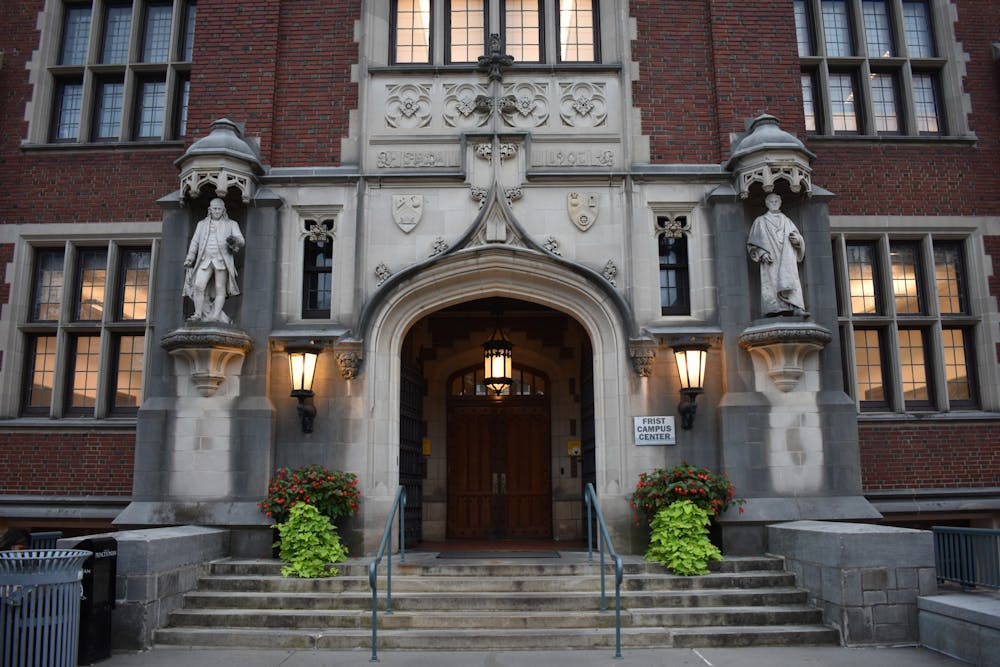Being accused of an Honor Code violation can be an extremely stressful and isolating experience. Amidst swirling rumors about a disciplinary incident in COS 126: Computer Science — An Interdisciplinary Approach, campus discussions on the procedures of the Committee on Discipline and Honor Committee have been renewed. In light of these discussions, The Daily Princetonian examined the history of an important part of the disciplinary process: Peer Representatives.
Princeton Peer Representatives emerged after a 2003 referendum, which called for an amendment to the Honor Code to allow peer representation for accused students. The group aims to aid students through the stresses of the investigation process.
Though the group originally helped students being investigated by the Honor Committee, it was reformed in November 2022 to also serve students facing the Committee on Discipline (COD).
Alice McGuinness ’24, a co-chair of the Peer Representatives, told the ‘Prince’ that despite the change, their roles are quite similar in both types of cases.
“The essence of what we do is the same in both the COD and the Honor Committee. We support students, we help make sense of evidence and help uplift the students voice, to share their truth of what happened with either committee. The processes look slightly different.”
The Honor Committee is composed solely of students, while the COD has a mix of students, faculty, and administrators. Additionally, the Honor Committee is limited to investigating accusations of Honor Code violations on in-class examinations. According to the COD website, the Committee handles “violations of rules and regulations pertaining to any academic work that is not performed in class, including essays, term papers, problem sets, homework, laboratory reports, and independent work,” as well as “serious non-academic misconduct.”
Brian Li ’24, deputy chair of the Peer Representatives, told the ‘Prince’ that although the group represents students, its goal is “not to be antagonistic towards the University,” but to be a “point person … who is there to explain things to them, to provide support, to help them gather their thoughts, and to be a voice of calm and reason.”
“We’re not interested in defense, we’re not interested in getting people off; what we are interested in is providing compassionate care” he added.

McGuinness and Li expressed the positive impact being a Peer Rep has on them.
“Being a Peer Rep is certainly among the most meaningful commitments I have on campus,” McGuiness said. “Brian and I are both RCAs and think we use some of the same skill sets and find similar meanings in both roles. I love being able to provide support to students during what can be a really stressful time and helping them make sense of the process.”
McGuinness described the training students undergo to become Peer Reps as “pretty intensive.” The training involves multiple members of the University community, including the chair of the Honor Committee, Counseling and Psychological Services (CPS) representatives, including Director of CPS Calvin Chin, and Senior Associate Dean Joyce Chen Shueh ’96, who is secretary of the COD and coordinates undergraduate disciplinary matters. McGuinness noted that there are typically two training sessions on the Honor Committee procedure, a separate COD procedure training, and a CPS training that uses PDAR, the Princeton Distressed Awareness Response Training, as well as active listening training.
Li explained that while the Peer Reps program in its current form has only existed for five years, “The ability for a student to be advised by a fellow student or a fellow member of the University community has existed for quite some time.”

To learn more about how students deal with accusations before the Peer Reps program, the ‘Prince’ interviewed Stanley Katz, a former professor in the School of Public and International Affairs. Katz worked with students brought before the COD to guide them through cases prior to the institution of the Peer Representatives program.
Katz stated, “The University regulations have always said that Princeton students can’t be represented by lawyers,” yet students have always been able to reach out to anyone in the University community.
“Very often, what has happened is that students have come to the small number of faculty members who either are lawyers or have legal training, to help them when they’re accused,” said Katz.
According to Katz, a small number of faculty with backgrounds in law, especially him and Robert George, helped students fight discipline charges. Katz added, “We are very different politically. Professor George represents a very conservative political point of view, I represent a very progressive political point of view, and yet, we are completely aligned when it comes to our attitude [on the discipline system].”
Katz primarily assisted students facing the COD for over three decades with, in his words, “very infrequent success.”
“I think they’re biased against defendants … So I thought it was very important to provide assistance to students who found themselves attempting to defend themselves against discipline charges,” he said.
When asked about his experience assisting students, Katz stated, “I came away radically unhappy with the University discipline system. I think it’s unfair to students.”
Katz noted students’ attempts to reform this “biased” process.
“Over the last five or eight years, there have been consistent attempts by students through the referendum process to reform the discipline system and to reform the Honor Code System,” Katz explained. “And those have mostly failed.”
While Katz and others would argue there is more opportunity for reform, the Peer Representatives program was a successful referendum that continues to thrive. The organization ensures that all accused students know about their right to a Peer Rep, and Peer Reps now have a dedicated University website that outlines their procedures, introduces students to their 16 members, and provides information about how to join.
Olivia Sanchez is a staff News writer for the ‘Prince.’
Please direct any corrections requests to corrections[at]dailyprincetonian.com.








